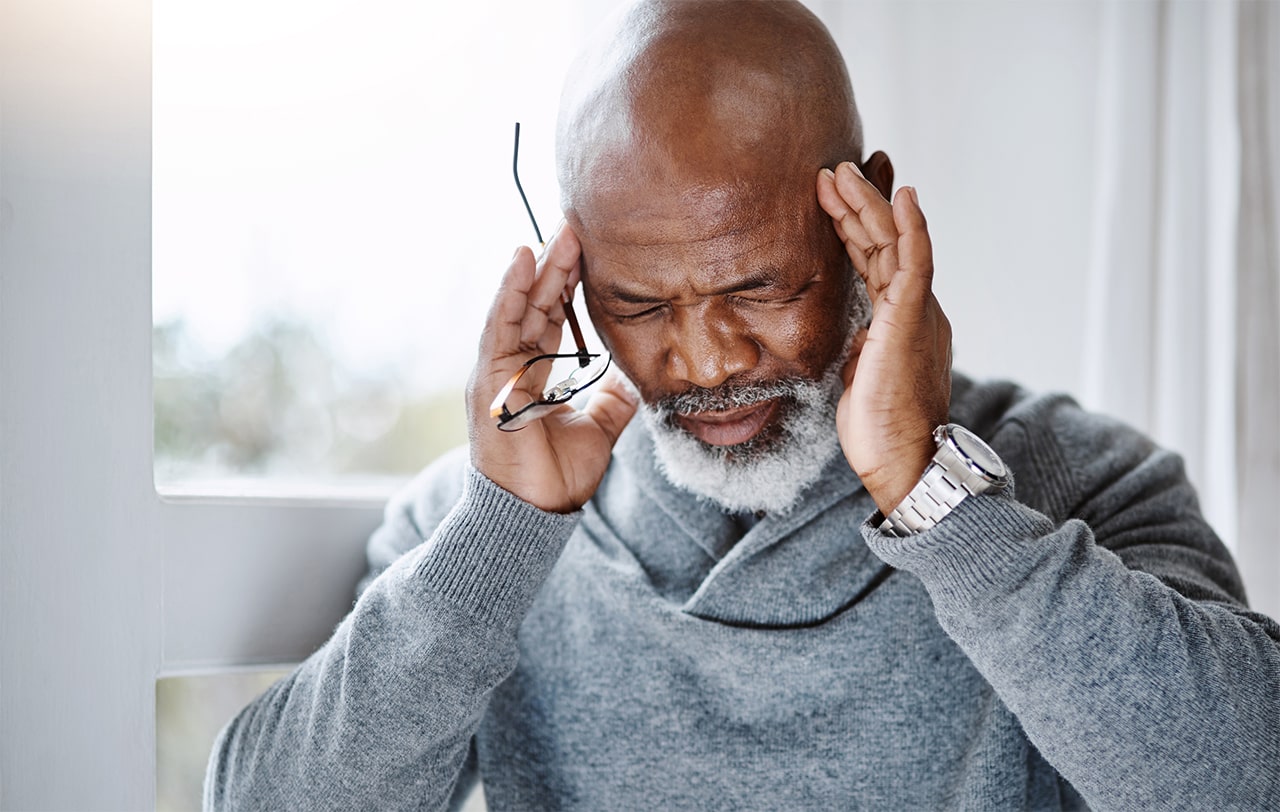- Close
- Back
- For Patients
- For Doctors
Migraine
Affecting more women than men, the migraine is a severe form of headache, experienced as an intense pain on one side of the head. There is some evidence that medical cannabis can reduce the regularity and intensity of migraines.


Learn more about conditions
A migraine is a type of headache, which is known to affect more women than men. It typically presents with a throbbing pain or pulsing sensation, usually across one side of the head. Migraine attacks can last from several hours up to multiple days, with the pain being so severe that it interferes with everyday activities. While some people have frequent migraines, others only experience them occasionally.
Around 30% of those people suffering from migraines experience auras before the onset of more troubling symptoms. Auras are warning signs that take shape in the form of flashing lights. In the majority of instances, migraines occur without these warning signs, sometimes without the development of a headache.
Primary symptoms of the migraine include an intense, throbbing, or pounding headache, located either at the front or one side of the head.
Other symptoms include:
- Nausea and vomiting
- Increased sensitivity to lights and sounds
- Sweating
- Poor concentration
- Stomach pain
- Diarrhoea
- Sleep loss
Although the exact cause of migraines is unknown, they are thought to be caused by temporary changes in the chemicals, nerves and blood vessels in the brain. They are particularly common among close relatives (parents, children, brothers, and sisters).
Established migraine facts include:
- They are three times more likely to affect women than men (triggers include the onset of the period and taking the contraceptive pill)
- Emotional triggers include stress, anxiety, anger, excitement, and shock
- They may also be triggered by the consumption of foods such as chocolate, cheese, and citrus fruits
While there is no absolute cure for migraines, there are a range of treatments known to alleviate the symptoms. These include painkillers, triptans and anti-emetics. The symptoms might also be lessened by spending time in a quiet darkened room and/or vomiting. Preventative medications such as beta-blockers, Topiramate, and supplements might also be an option.
Several observational studies and patient surveys have reported that medical cannabis can reduce headache frequency in migraine sufferers as well as improve sleep. These effects may allow for reduction in the intake of anti-migraine triptan medications, as reported in several clinical trials. High-THC medical cannabis strains appear to be the most commonly used preparations among patients suffering from migraines.
FAQs about Medical Cannabis


Yes. Cannabis-based medicinal products (CBMPs) have been legal since the 1st of November 2018, when they moved from a Schedule 1 product to a Schedule 2 product. This reflects their potential for medical use.
Cannabis-based medicinal products, also known as CBMPs, can be prescribed by private consultants, when appropriate, within their specialty area when there is unmet clinical need.
In the UK cannabis medicines are accessed primarily via private clinics. However, any specialist physician can prescribe cannabis medicines. GROW® is here to provide education and support to any specialists looking to prescribe or just to find out more.
There are 3 licensed medicines which contain cannabinoids – Epidiolex for some forms of epilepsy, Sativex for multiple sclerosis (MS), and Nabilone for chemotherapy-induced nausea and vomiting (CINV). However, only a handful of prescriptions have been issued in the NHS to date.
Most cannabis-based medicinal products (CBMPs) are instead unlicensed, and they must be written on a private prescription, typically issued by private clinics specialising in medical cannabis treatment.
Cannabis medicines come in multiple forms; flowers, often referred to as herbal cannabis (to be vaporised, rather than smoked), oils (taken under the tongue) and capsules. Cannabis medicines come in high-THC, high-CBD and balanced varieties.
Smoking medical cannabis is illegal. Medical cannabis can instead be taken in different forms depending on the desired speed of onset and duration of action, which is discussed between the patient and their doctor.
It’s important to find a clinic that works for you. Most importantly you need to find a Doctor that specialises in your condition. For example, patients with pain will need to see pain specialist, while those with a mental health condition must see a psychiatrist.
It’s important for patients to know they can use any pharmacy that supplies the appropriate medicines in the UK.
Some clinics have a preferred pharmacy but will be able to send prescriptions to others if needed. If patients have any questions about available medicines, they can contact IPS Pharma.
To speed up the process, patients should bring a copy of their medical records. These are then forwarded to the clinic in advance of the first consultation.
No. Cannabis-based medicinal products (CBMPs) are only prescribed by GMC-registered specialist doctors. As they are medicinal, CBMPs are regulated by the Medicines and Healthcare products Regulatory Agency (MHRA); which ensures the safety, quality, and effectiveness of medicines in the UK.
Over-the-counter (OTC) CBD products can be purchased without a prescription in pharmacies, health food shops, or online. These may come in forms such as oil tinctures, capsules, or vapes. They are not medicinal products as they are regulated by the Food Standards Agency (FSA) as a food supplement, with a 0.3% limit on THC.
Patients are free to seek a second opinion from another clinic. Patients should ensure the clinic has communicated their reasons for deciding not to prescribe. It may be that they feel you should try other medicines before trying cannabis medicines, or that they need to see more information about your medical history before they are happy to prescribe.
For patient enquiries - [email protected]
For doctor enquiries - [email protected]
For all other enquiries – [email protected]
Healthcare professionals can also sign up to our Doctor Portal.


